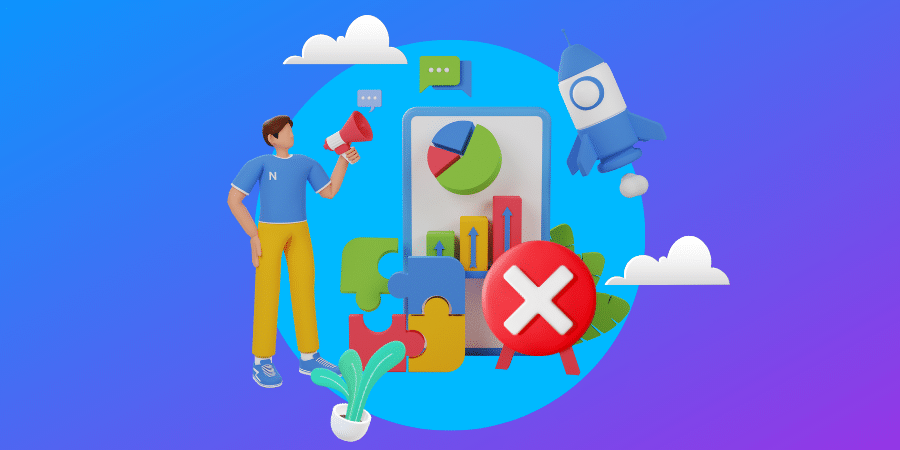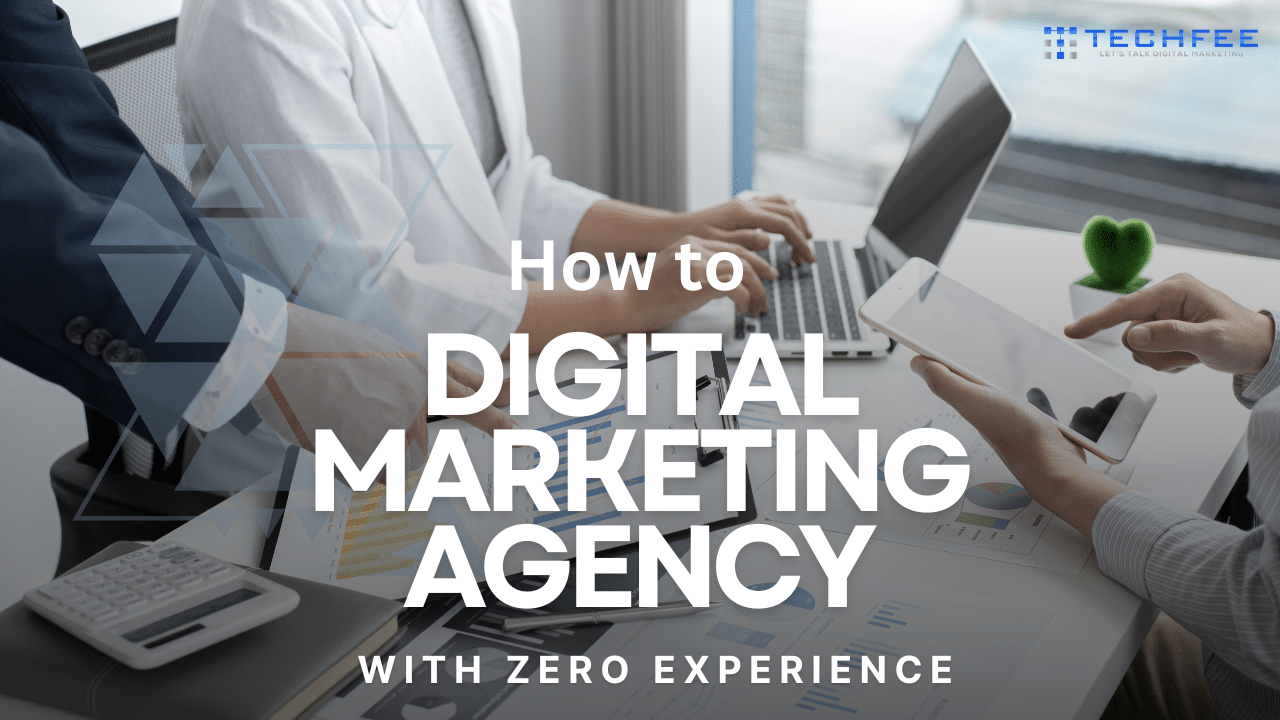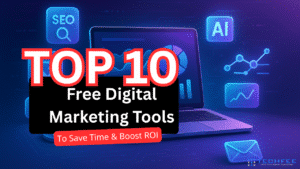Starting a digital marketing agency with no experience may seem challenging, but it’s a highly achievable and rewarding venture with the right approach.
Just think you’re browsing your social media feed, and a post from a local coffee shop pops up.
It’s not just a random ad—it’s engaging, perfectly crafted, and makes you want to visit immediately.
That’s the power of digital marketing.
Today, businesses thrive or struggle based on their online presence, and behind every successful campaign is a skilled digital marketing agency.
Now, imagine starting your own digital marketing agency without any prior experience.
It might sound not very safe, but it’s far more achievable than you think.
With the right plan, tools, and a willingness to learn, you can build an agency that helps businesses grow while creating an exciting career for yourself.
According to Statista, In 2023, there were 54.22 thousand digital advertising agencies in the United States. In the presented period, the number increased at a compound annual growth rate (CAGR) of 14.5 percent.

This guide will walk you through every step of the process.
From understanding why the digital marketing industry is booming to overcoming beginner challenges and crafting a roadmap for success, you’ll learn how to start from scratch and turn your vision into reality.
Ready to take the first step toward building your own agency?
Let’s get started!
Why Start a Digital Marketing Agency in 2025?
The year 2025 presents an unparalleled opportunity to dive into the digital marketing industry, and here’s why:
Growing Industry Demand
The demand for digital marketing services has skyrocketed as businesses across industries realize the necessity of establishing a robust online presence.
From small local stores to multinational corporations, every brand is investing in digital strategies to reach their target audience and stay competitive.
Additionally, with global digital ad spend projected to hit new highs, there is ample room for newcomers to carve their niche in this rapidly growing market.
The digital economy shows no signs of slowing down, making this the perfect time to step into the game.
Low Initial Investment
Unlike traditional businesses, starting a digital marketing agency doesn’t require a large upfront investment.
You can operate without a physical office, as most work can be done remotely.
Affordable tools and platforms, such as free trials of marketing software, budget-friendly website hosting, and cloud-based project management tools, make it easy to set up your business without breaking the bank.
This low-cost entry point ensures that even beginners with minimal resources can get started and focus on building their expertise.
Flexibility and Scalability
One of the greatest advantages of running a digital marketing agency is the flexibility it offers.
You can work from anywhere, set your own hours, and design your workflow to fit your lifestyle.
As your agency grows, it’s easy to scale operations by adding team members or expanding your service offerings.
You can start solo, working on small projects, and gradually grow into a full-service agency serving high-profile clients.
This scalability allows you to grow at your own pace while maximizing your potential for long-term success.
Starting a digital marketing agency in 2025 is not just about capitalizing on a booming industry—it’s about creating a business that fits your ambitions, leverages growing demand, and provides the flexibility to thrive in the modern world.
What Do Businesses Look for in a Digital Marketing Agency?
When businesses seek a digital marketing agency, they have specific expectations to ensure their investment yields measurable results.
Here’s what they prioritize:
Expertise in Digital Channels
Businesses expect agencies to have a deep understanding of various digital marketing channels such as SEO, PPC, social media, and email marketing.
Each channel serves a unique purpose—from driving organic traffic through search engines to engaging audiences on social media platforms.
An agency that demonstrates expertise in leveraging these channels can craft tailored strategies that align with a client’s goals.
Whether it’s optimizing website content for better search rankings or running targeted ads, businesses look for agencies with the skills to maximize the potential of every platform.
Cost-Effective Solutions
For many businesses, especially small and medium-sized enterprises, budget constraints are a major concern.
They seek agencies that can deliver a high return on investment (ROI) without overspending.
Offering cost-effective solutions, such as data-driven campaigns and efficient resource allocation, reassures clients that their marketing dollars are being used wisely.
Agencies can meet clients’ financial expectations while demonstrating value by focusing on strategies that drive tangible results, like increased sales or improved brand visibility.
Result-Driven Strategies
Ultimately, businesses want outcomes, not just promises.
Agencies that focus on result-driven strategies, such as converting leads into loyal customers or boosting overall engagement, stand out in the crowded marketplace.
Clear metrics like conversion rates, customer retention, and sales growth are crucial indicators of success.
Agencies that can track, measure, and optimize these metrics while adapting to client needs showcase their commitment to delivering real, impactful results.
By excelling in these areas, a digital marketing agency can build trust, foster long-term partnerships, and become an indispensable part of a business’s growth strategy.
Challenges of Starting a Digital Marketing Agency with No Experience
Starting a digital marketing agency with no prior experience can be daunting, as it comes with unique challenges that require strategic solutions.
Here’s a closer look at these challenges and how to overcome them:
Competition in the Industry
The digital marketing industry is highly competitive, with countless agencies vying for clients.
Standing out in such a crowded market can feel overwhelming, especially for newcomers.
To differentiate your agency, focus on developing a niche or specializing in a particular industry.
This allows you to position yourself as an expert in a specific area, making it easier to attract clients who need tailored solutions.
Additionally, showcasing your unique approach or offering personalized services can help you carve out a distinct identity in the market.
Building Trust Without a Portfolio
Without a proven track record, earning a client’s trust can be a significant hurdle. To address this, start by working on small projects for friends, family, or local businesses to build an initial portfolio.
Offering discounted or pro bono services in exchange for testimonials can also help establish credibility.
Create detailed case studies for these projects, highlighting the challenges faced, strategies implemented, and results achieved.
These tangible examples demonstrate your skills and help potential clients feel more confident about working with you.
Learning Curve
As a beginner, you must balance learning essential skills with delivering results for your clients.
Digital marketing is a dynamic field that requires continuous education on trends, tools, and strategies.
To manage the learning curve effectively, dedicate time to self-education through online courses, webinars, and industry blogs while applying your knowledge to client work.
Staying organized with time management tools and prioritizing skill development alongside client satisfaction will ensure steady growth in your expertise and business.
While these challenges may seem intimidating, they also present opportunities to innovate, grow, and prove your value in the competitive world of digital marketing.
With persistence and the right strategies, you can overcome these obstacles and build a successful agency from the ground up.
Step-by-Step Guide: How to Start a Digital Marketing Agency with No Experience

Starting a digital marketing agency without experience requires a clear roadmap and a strategic approach.
Here’s a detailed step-by-step guide to help you navigate the process:
Learn the Basics of Digital Marketing
Begin by acquiring foundational knowledge in key areas like SEO, PPC, social media, email marketing, and content creation.
Use free resources like Google Skillshop, HubSpot Academy, and YouTube tutorials, or invest in paid courses for more in-depth learning.
Complement your studies by experimenting with personal projects, such as optimizing your blog or running small campaigns, to gain hands-on experience.
Freelancing on platforms like Fiverr or Upwork can also provide practical insights while earning your first clients.
Choose a Niche
Specializing in a specific niche, such as e-commerce, real estate, or healthcare, can set you apart in a competitive market.
A niche allows you to tailor your services and become an expert in solving industry-specific challenges.
To identify a profitable niche, consider industries you’re passionate about or those with high demand for digital marketing services.
Research market trends and analyze competitors to find gaps you can fill.
Build a Strong Online Presence
Establish your credibility by creating a professional website that showcases your expertise, services, and case studies.
Optimize your site for SEO to attract organic traffic and include a blog to share valuable insights.
Set up social media profiles on platforms like LinkedIn, Facebook, and Instagram to engage with potential clients and share your content.
A strong online presence demonstrates your skills and makes it easy for clients to find you.
Offer Value with Free or Low-Cost Services Initially
Since you lack a portfolio, start by offering free or low-cost services to small businesses, friends, or non-profits.
This helps you gain real-world experience while building a collection of successful projects.
Request testimonials from satisfied clients and use them as social proof to attract new clients.
Document your work in detailed case studies to showcase your problem-solving abilities.
Define Your Business Model
Decide on the structure of your agency—whether you want to operate as a freelancer, consultant, or full-service agency.
This choice will guide your pricing and service offerings. Create clear packages tailored to different client needs, such as monthly retainers, project-based pricing, or performance-based fees.
A well-defined business model ensures consistency and professionalism.
Acquire Your First Clients
Use your personal network to find initial clients.
Reach out to friends, family, and former colleagues who might need digital marketing help. Join platforms like LinkedIn and Upwork to connect with potential clients.
Develop cold outreach strategies, including personalized emails and proposals, to pitch your services effectively. Persistence and adaptability are key to landing your first few projects.
Invest in Essential Tools
Equip yourself with budget-friendly tools to manage campaigns, analyze data, and streamline operations.
Use free options like Google Analytics, Canva, and Buffer to start. As you grow, invest in advanced tools like SEMrush for SEO or HubSpot for CRM.
Project management tools like Trello or Asana can help you stay organized and deliver work efficiently.
Deliver High-Quality Results
Focus on exceeding client expectations by delivering exceptional results.
Communicate regularly with clients to ensure alignment on goals and outcomes.
Collect feedback after each project and use it to refine your services. A reputation for high-quality work can lead to referrals and long-term partnerships.
Scale Your Operations
As your client base grows, consider hiring specialists or freelancers to handle specific tasks like graphic design or copywriting.
Diversify your services by adding offerings such as video marketing or web development.
Scaling your operations strategically ensures sustainable growth without compromising quality.
Continue Learning and Adapting
The digital marketing landscape is constantly evolving, so it’s essential to stay updated on industry trends, tools, and algorithms.
Invest in certifications like Google Ads or Facebook Blueprint to enhance your expertise. Attend webinars, read industry blogs, and network with other marketers to stay ahead of the curve.
By following these steps, you can successfully launch and grow a digital marketing agency, even with no prior experience.
Patience, persistence, and a commitment to learning are the keys to building a thriving business.
How to Build Trust and Credibility in Your Digital Marketing Agency
Building trust and credibility is crucial for a digital marketing agency, especially when you’re just starting out.
Here’s how you can establish yourself as a reliable choice for clients:
Showcase Your Expertise
One of the best ways to prove your skills is by creating and sharing valuable content.
Publish blogs, case studies, or web stories that highlight your knowledge and success in digital marketing.
For instance, write detailed blog posts on effective SEO strategies or share a web story about a recent campaign you executed successfully.
Case studies are particularly powerful—they demonstrate your ability to solve problems and deliver results.
Even if you’re new, you can create case studies based on hypothetical scenarios or personal projects to showcase your approach and strategies.
Transparent Communication
Honesty is key to building trust. Be upfront about your capabilities, experience level, and the services you offer.
If there’s a task outside your current expertise, communicate that clearly instead of overpromising.
Transparency helps manage client expectations and builds confidence in your professionalism.
Clients appreciate agencies that prioritize integrity and are more likely to stick with you when they know you’ll deliver on your promises.
Build Long-Term Relationships
Focus on fostering relationships that go beyond short-term projects.
Provide value-added services, such as offering free performance reviews or suggesting additional strategies that can benefit your clients.
Regularly check in with your clients to understand their evolving needs and demonstrate that you care about their success.
Long-term relationships not only bring consistent revenue but also lead to referrals and a strong reputation in the industry.
By consistently showcasing expertise, maintaining transparency, and nurturing client relationships, you can establish a trustworthy brand that clients are eager to work with, even if your agency is new to the market.
Common Mistakes to Avoid When Starting a Digital Marketing Agency

Starting a digital marketing agency with no experience can be a rewarding journey, but avoiding common pitfalls is crucial to ensuring success.
Here are some key mistakes to watch out for:
Overlooking Proper Market Research
Skipping market research is one of the biggest mistakes beginners make.
Without understanding your target audience, their pain points, and the competition, you risk offering services that don’t align with market demand.
Take the time to analyze your potential clients, identify industries with unmet needs, and study your competitors to find gaps you can fill.
Market research ensures your agency starts with a strong foundation and a clear direction.
Lacking Clear Goals or Strategy
Jumping into business without setting clear goals or a solid strategy can lead to disorganization and inefficiency.
Define your agency’s mission, vision, and short-term and long-term objectives.
Create a roadmap that outlines the services you’ll offer, how you’ll acquire clients, and the metrics for measuring success.
A well-thought-out strategy keeps you focused and helps you track progress.
Neglecting Client Communication
Poor communication can quickly erode trust and damage client relationships.
Keep clients informed about project progress, challenges, and results through regular updates and transparent conversations.
Actively listen to their needs and concerns to deliver tailored solutions.
Effective communication not only ensures client satisfaction but also encourages long-term partnerships and referrals.
Offering Too Many Services Without Expertise
Trying to offer a wide range of services when you’re just starting can spread you too thin.
Clients value quality over quantity, so it’s better to specialize in a few core areas where you can deliver exceptional results.
As your skills grow, you can gradually expand your offerings.
Starting with a focused niche allows you to build expertise, gain credibility, and stand out in the competitive market.
Underestimating the Power of Personal Branding
Your personal brand is a reflection of your agency’s credibility and values.
Neglecting to build a strong personal brand can make it harder to attract clients.
Showcase your expertise through social media, blogs, webinars, or public speaking engagements.
Share insights, success stories, and tips that establish you as a thought leader in digital marketing. A strong personal brand builds trust and sets you apart from competitors.
Avoiding these common mistakes can help you launch your digital marketing agency with confidence, ensuring that you build a business that thrives in a competitive industry.
How Much Does It Cost to Start a Digital Marketing Agency?
Starting a digital marketing agency doesn’t have to be an expensive venture.
With the right approach, you can keep your initial costs low while still setting yourself up for success.
Here’s a breakdown of what you’ll need to invest in and affordable alternatives to consider:
Initial Costs
The primary expenses for starting a digital marketing agency include setting up your online presence and acquiring essential tools.
First, you’ll need a website, which requires purchasing a domain name (typically $10–$20 per year) and website hosting (starting at $5–$15 per month).
Your website serves as your agency’s portfolio and credibility hub, so investing in a professional design is crucial.
Additionally, tools for SEO, social media management, and analytics are essential to deliver effective services.
While premium tools like SEMrush, Hootsuite, or HubSpot may come with higher price tags, they offer comprehensive features that can enhance your operations.
Low-Cost Alternatives
For those just starting, there are plenty of budget-friendly options.
Many platforms offer free trials or basic versions of their tools, such as Canva for graphic design, Buffer for social media scheduling, and Google Analytics for website tracking.
Open-source platforms like WordPress can be used to build your website, saving on design costs.
You can also take advantage of free or affordable email marketing platforms like Mailchimp for client outreach and campaigns.
As your agency grows and generates revenue, you can transition to more advanced tools to support scaling.
By carefully managing your expenses and leveraging low-cost alternatives, you can keep your startup costs manageable while still building a professional and competitive digital marketing agency.
How to Grow Your Digital Marketing Agency

Growing a digital marketing agency requires a strategic approach to ensure long-term success.
Here are three key areas to focus on for sustainable growth:
Focus on Client Retention
Client retention is one of the most cost-effective ways to grow your agency. Satisfied clients are more likely to stick with you and refer your services to others.
To retain clients, prioritize delivering consistent results and providing exceptional service.
Regularly update them on the progress of their campaigns with clear reports and insights, and proactively address any challenges.
Building strong relationships through excellent communication and responsiveness ensures clients see the value in your work, making them long-term partners in your success.
Diversify Services
As your agency grows, consider adding complementary services to meet a broader range of client needs.
For example, if you specialize in SEO or PPC, you could expand into content creation, email marketing, or graphic design.
Offering a more comprehensive suite of services not only attracts a diverse client base but also increases your revenue potential.
Before expanding, ensure you have the expertise or hire specialists to maintain the high quality your clients expect.
Leverage Networking and Referrals
Networking is a powerful way to grow your agency by building connections and gaining visibility.
Attend industry events, workshops, and conferences to meet potential clients and collaborators.
Establish partnerships with complementary businesses, such as web development firms or PR agencies, to exchange referrals.
Additionally, encourage satisfied clients to refer your services to their network by offering incentives like discounts or free consultations.
Positive word-of-mouth can significantly boost your agency’s credibility and client base.
By focusing on client retention, diversifying your offerings, and leveraging networking opportunities, you can steadily grow your digital marketing agency while maintaining a reputation for quality and reliability.
Also Read These Related Articles:
How To Start A Digital Marketing Agency Like An Expert In 2024
How To Get Into Digital Marketing: Expert Tips And Tricks
Conclusion on How to Start a Digital Marketing Agency With No Experience
Starting a digital marketing agency with no experience might seem challenging at first, but with the right approach, it’s entirely achievable.
By learning the fundamentals, choosing a niche, building a strong online presence, and focusing on delivering exceptional results, you can establish a thriving agency that helps businesses grow while creating a fulfilling career for yourself.
Along the way, avoid common mistakes, prioritize client relationships, and continuously adapt to industry trends to stay competitive.
The key is to take that first step with confidence.
Whether it’s experimenting with personal projects, creating your website, or reaching out to potential clients, every small action moves you closer to your goals.
Remember, every successful agency started somewhere—and so can you.
If you found this guide helpful, subscribe to our newsletter for more actionable tips, resources, and insights on building a successful digital marketing career.
Have questions or need guidance?
Feel free to comment below or explore our related articles to keep learning and growing. Now’s the time to turn your vision into reality—go for it!
FAQs on How to Start a Digital Marketing Agency with No Experience
Can I really start a digital marketing agency with no experience?
Yes, you can start a digital marketing agency with no experience, but it requires dedication to learning and strategic planning. Begin by mastering the basics of digital marketing through free or affordable resources like Google Skillshop or HubSpot Academy. Experiment with personal projects or freelance gigs to gain hands-on experience. Focus on building a strong online presence, showcasing your knowledge through blogs or case studies, and starting with smaller clients to build credibility.
How do I attract clients without a portfolio?
Attracting clients without a portfolio can be challenging but not impossible. Start by offering free or discounted services to local businesses, friends, or family in exchange for testimonials and case studies. Create a professional website and highlight any personal projects or hypothetical campaigns that demonstrate your expertise. Leverage platforms like LinkedIn to connect with potential clients, and pitch your services by focusing on the value you can deliver rather than the experience you lack.
What tools do I need to start a digital marketing agency?
To start a digital marketing agency, you'll need tools to streamline operations and deliver effective campaigns. Here are some essentials:
- SEO: Google Analytics, Ahrefs, SEMrush (or free alternatives like Ubersuggest).
- Social Media Management: Buffer, Hootsuite, or Canva for content creation.
- Email Marketing: Mailchimp or Sendinblue.
- Project Management: Trello or Asana.
- Communication: Zoom, Slack, or Google Workspace.
- These tools help manage tasks efficiently without requiring a significant upfront investment.
How long does it take to make a profit?
The time it takes to make a profit depends on various factors, including your initial investment, pricing strategy, and ability to acquire clients. Many agencies start seeing profits within 6–12 months, but it can happen sooner if you keep costs low, focus on client retention, and consistently deliver high-quality results. Scaling up your operations and diversifying services can accelerate your journey to profitability. Patience and persistence are key.









